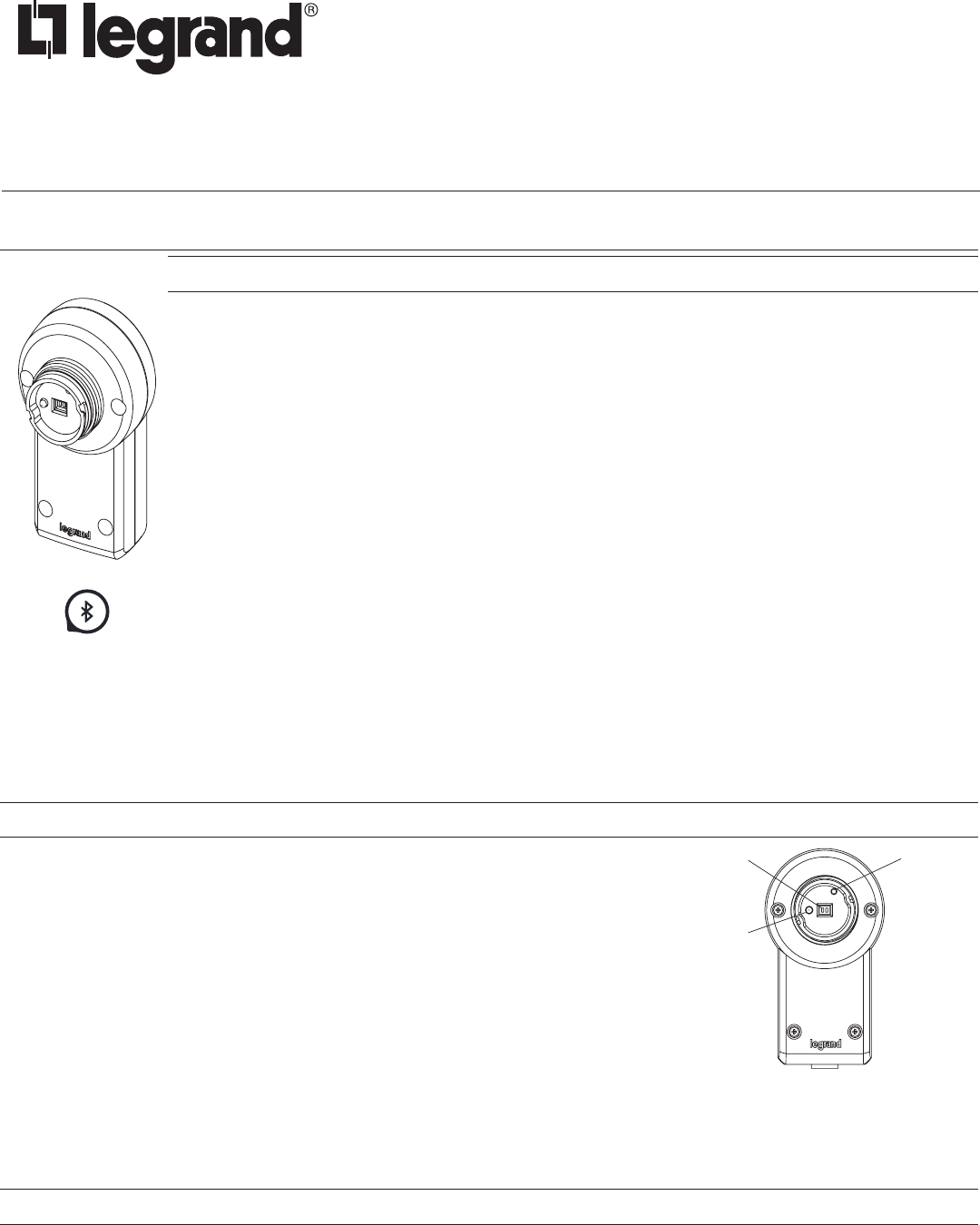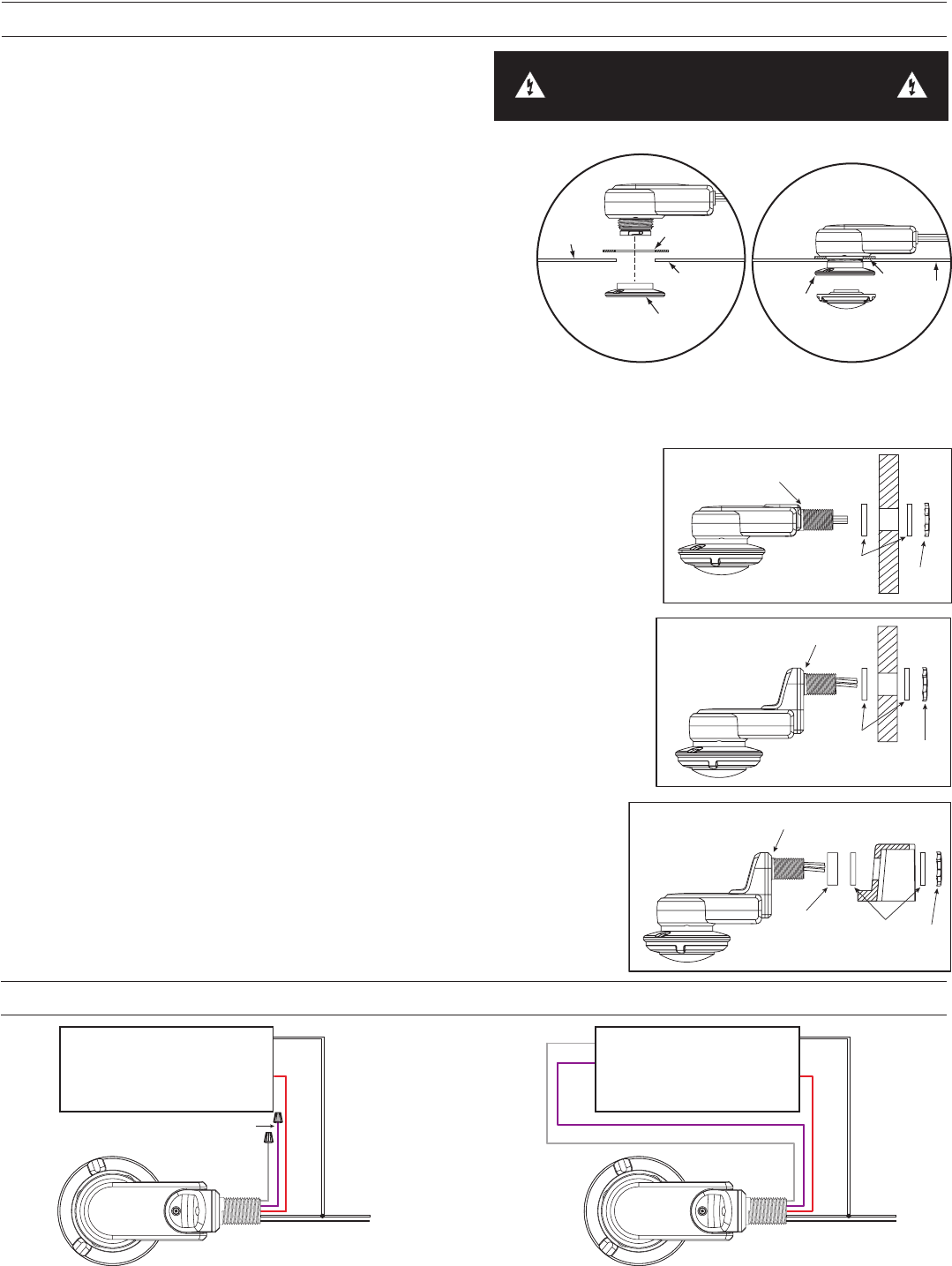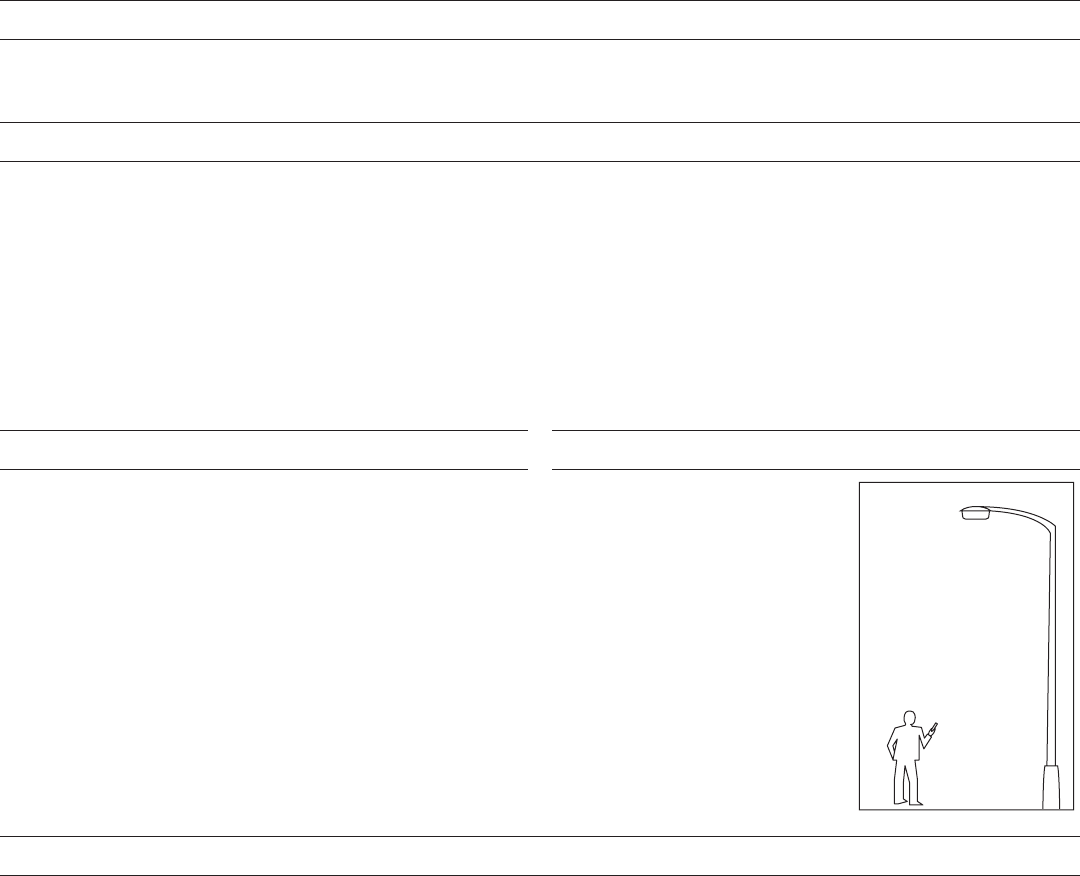The Watt Stopper FSP-3X1 PIR fixture integrated sensor User Manual
The Watt Stopper, Inc. PIR fixture integrated sensor Users Manual
Contents
- 1. Users Manual
- 2. User Manual
Users Manual

Wattstopper
®
Single/Dual Phase (Universal), High/Low/Off,
PIR Fixture Integrated Outdoor Sensor In IP66 Enclosure
Monophasé/Biphasé (Universel), Haut/Bas/Éteint,
Luminaire avec capteur IRP extérieur intégré dans un boitier IP66
Fase simple/doble (universal), Alto/Bajo/Apagado,
Sensor exterior integrado del aplique PIR en gabinete IP66
Installation Instructions • Instructions d’Installation • Instrucciones de Instalación
No: xxxxx – 03/17 rev. 1
Catalog Numbers • Les Numéros de Catalogue • Números de Catálogo: FSP-321B, FSP-321B-S, FSP-321B-D
Country of Origin: Made in China • Pays d’origine: Fabriqué en Chine • País de origen: Hecho en China
SPECIFICATIONS
Voltage ......................................100-347VAC (single phase)
............................. 208/230/480VAC phase-to-phase
Load Ratings
@230-240V .................... 0-300W Ballast or LED Driver
@ 120V ........0-800W Tungsten, Ballasts or LED Driver
@ 277V ........................ 0-1200W Ballast or LED Driver
@347/480V .................. 0-1200W Ballast or LED Driver
Motor @ 120V/277V............................................1/6 HP
Wiring
Length .......36” (91.44cm), 30” (76.2cm) from nipple
Line Voltage .................................... Line, Neutral, Load
Low Voltage ............Dim + (violet), Dim - (gray) 18AWG
Operating Temperature ..........-40°F (-40°C) to 167°F (75°C)
Tightening Skirt/Nut Torque .................................25-30 in-lbs
Dimensions
Collar ...................................... 1.30” diameter (33.0mm)
Collar height .......................................... 0.64” (16.3mm)
Body ..... 5.7”L x 2.3”W x 3.5”H (145mm x 60mm x 90mm)
Weight 2.8 oz (80 g)
Enclosure ................................................. IP66 (NEMA STD)
Coverage
FSP-L2 Lens @ 8’ height .................. up to 44’ diameter
FSP-L3 Lens @ 20’ height ................ up to 40’ diameter
FSP-L7 Lens @ 40’ height .............. up to 100’ diameter
Adjustments and Features
High Mode .......................................................0 V -10 V
Low Mode .............................................. 0 V - 9.8 V, Off
Time Delay ......................... 30 seconds, 1 min - 30 min
Cut Off ..................... Disable, 1 min - 59 min ,1 hr - 5 hr
Sensitivity .....................On-Fix, Off-Fix, Low, Med, Max
Hold Off Setpoint .....................Auto, None, 1 fc - 250 fc
Ramp Up ................................... Disable, 1 sec - 60 sec
Fade Down ................................ Disable, 1 sec - 60 sec
Photocell Setpoint for On/Off ............................1-250 fc
Factory Defaults
High Mode .............................................................. 10 V
Low Mode ................................................................ 1 V
Time Delay ............................................................5 min
Cut Off ..................................................................... 1 hr
Sensitivity ...............................................................Max
Hold Off Setpoint ...............................................Disable
Ramp Up ............................................................Disable
Fade Down .........................................................Disable
Photocell Setpoint for On/Off .............................Disable
DESCRIPTION AND OPERATION
The FSP-321B is an IP66 rated motion sensor that dims lighting from high to low based
on movement.
Three configurations are available. The FSP-321B mounts inside the fixture and the PIR lens
connects to the FSP-321B through a 1.30” diameter hole in the bottom of the fixture. The
FSP-321B-S mounts to a fixture/enclosure with a 1/2” knock out, via a nipple on the back.
The FSP-321B-D has a drop mount nipple, for mounting on to a pole, or to a fixture.
The sensor uses passive infrared (PIR) sensing technology that reacts to changes in
infrared energy (moving body heat) within the coverage area. Once the sensor stops
detecting movement and the time delay elapses, lights will go from high to low mode
and eventually to an OFF position if it is desired. Sensors must directly “see” motion of a
person or moving object to detect them, so careful consideration must be given to sensor
luminaire placement and lens selection. Avoid placing the sensor where obstructions may
block the sensor’s line of sight.
The FSP-321B operates at 100-347V Single Phase, as well as 208/230/480VAC phase-to-phase. No power pack is required. It is
designed to be installed in indoor and outdoor environments.
NOTE: When the FSP-321B is powered up the first time, it the will use factory default parameters to operate. If adjustments are
needed, the FSIR-100 configuration tool must be used.
LENS OPTIONS
Several lenses are available for use with the FSP-321B. Lenses give coverage at mounting heights between 8’ - 40’ for applications
such as, offices, warehouses and outdoor use. Density and range of the coverage is determined by the type of lens and mounting
height. Lens modules are IP-66 rated when combined with an FSP-321B sensor mounted to an outdoor rated fixture. See the FSP-Lx
Coverage Guide for more information.
Light Sensor
Motion Indicator
Blue LED
PIR Sensor

2
There are three configurations of the sensor:
• The FSP-321B mounts inside the fixture.
• The FSP-321B-S mounts to a fixture or an enclosure with a 1/2”
knockout.
• The FSP-321B-D mounts to a pole or fixture.
Mounting Inside the Fixture
1. Determine an appropriate mounting location inside the light fixture
minimizing the electric light contribution to the sensor’s photocell.
Allow a minimum distance of 0.2” (5.1mm) from the wiring end of
the sensor to the wall of the fixture.
2. Drill a hole 1.30” (33.0mm) in diameter through the sheet metal in
the bottom of the fixture.
3. Add the rubber gasket to the threaded collar, and install the
sensor face down, parallel to the mounting surface. Ensure the
rubber gasket touches the inside surface of the fixture. Install
the skirt securely against the fixture to a torque of 25-30 in-lbs to
ensure IP rating is maintained.
Mounting to a Fixture/Enclosure – Straight Nipple
1. Determine an appropriate mounting location minimizing the
electric light contribution to the sensor’s photocell.
2. If there is no knockout, drill a hole 0.875” (22mm) in diameter through the sheet
metal in the fixture or enclosure.
3. Add the rubber gasket to the nipple, and install the sensor face down. Ensure the
rubber gasket touches the surface of the fixture. Install the nipple nut securely
against the fixture to a torque of 25-30 in-lbs to ensure IP rating is maintained.
Mounting to a Pole or Fixture – Drop Nipple
1. Determine an appropriate mounting location on the pole.
2. Drill a hole 0.875” (22mm) in diameter through the pole.
3. Add the rubber gasket to the nipple, and install the sensor face down. Ensure the
rubber gasket touches the surface of the fixture. If needed, add the nut between
the sensor body and the rubber gasket to ensure a secure fit. Install the nipple
nut securely against the fixture to a torque of 25-30 in-lbs to ensure IP rating is
maintained.
Completing the Installation
1. Align the locking features between the sensor and lens module and push the lens
module forward until the o-ring seals firmly. Turn the lens module clockwise to
ensure it locks in place.
2. Connect wires as shown in wiring diagram.
3. Restore power from the circuit breaker.
NOTE: The IP66 rating for this unit is based on proper installation as indicated above.
However, as Fixture housings may vary in thickness, material, and hole dimensions
to accommodate this unit, all precautions to maintain IP66 should be be considered
with the combination and installation of the unit to the Fixture Housing. This includes
installation to an IP66 rated Fixture Housing and use of suitable outdoor rated
silicone seals or accessories.
WIRING
Non-Dimming
Load
Load
(Red)
Gray
Violet
Neutral or
Phase B
White with
Black Stripe
s
Neutral or
Phase B
Black Line or
Phase A
Dimming
Load
Neutral or
Phase B
White with
Black Stripe
s
Load
(Red)
Neutral or
Phase B
Black Line or
Phase A
Dim (-)
Gray
Dim (+)
Violet
Skirt
Fixture
Wall
Lens Assembly
Outside
Fixture Wall
Inside Fixture
Wall
Mounting Within Fixture
Rubber
Gasket
Rubber
Gasket
Skirt
12
NOTE: The Outside Fixture Wall thickness should be no
greater than 0.125” (3.18mm) for optimal sensor
mounting and security.
INSTALLATION
WARNING
TURN THE POWER OFF AT THE CIRCUIT BREAKER
BEFORE INSTALLING THE SENSOR.
Straight Nipple Mount
Nipple
Rubber
Gaskets Nipple
Nut
Drop Nipple Mount
Nipple
Nut
Nipple
Rubber
Gaskets
Drop Nipple Mount
Nipple
Rubber
Gaskets
Nipple
Nut
Nut

3
FSP-321B CONFIGURATION
The configuration process establishes the appropriate parameters for the FSP-321B operation. This is done through the FSBT mobile
application with Andriod version 4.3 or higher and iOS. If no configuration steps are taken, the sensor will use its default parameter
values.
USING THE FSBT CONFIGURATION SOFTWARE
The FSBT Bluetooth Configuration Software is a mobile app for changing defaults and testing of the FSP-321B. It provides wireless
access to the FSP-321B sensors for parameter changes and testing.
The FSBT display shows menus and prompts to lead you through each process. The mobil app provides a simple way to navigate
through the customization fields.
Within a certain mounting height of the sensor, the FSBT allows modification of the system without requiring ladders or tools.
The FSBT allows bi-directional communication between the FSP-321B and the FSBT configuration app . Simple menu screens let you
see the current status of the sensor and make changes. It can change FSP-321B sensor parameters such as high/low mode, sensitivity,
time delay, cut off and more. With the FSBT you can also establish and store FSP-321B parameter profiles.
Add QR code for app download
TROUBLESHOOTING
Lights will not go to High Mode:
• Check all wire connections and verify the load and the ground wires are tightly secured.
• Make sure that the sensor is not obstructed.
• Check light level parameter, to find out the amount of light that the sensor is detecting. Cover the sensor lens to simulate darkness
in the room. If the lights come ON, the setpoint needs to be adjusted. If set for minimum, more than 1 fc at the sensor of ambient
light will cause
the lights to be held OFF. See the new settings section for instructions.
• If lights still do not turn ON, call 800.879.8585 for technical support.
Lights will not go into Low Mode:
• The time delay can be set from a minimum of 30 seconds to a maximum of 30 minutes. Ensure that the time delay is set to the
desired delay and that there is no movement within the sensor’s view for that time period.
• To quickly test the unit operation, enable test mode and move out of the sensor’s view. Lights should fade to low mode after 5
seconds.
• If lights still do not fade to Low Mode, call 800.879.8585 for technical support
Lights will not turn OFF:
• Cut Off time may be set to “Disable.”
• Ensure that the Cut Off is set to the desired time and that there is no movement within the sensor’s view for that time period when
the lights are in Low Mode.
• To quickly test the unit operation, enable test mode and move out of the sensor’s view. Lights should fade to low mode after 5
seconds and the OFF (if cut off is enabled) after 10 sec.
• If lights still do not turn OFF, call 800.879.8585 for technical support.
NAVIGATION
Navigation is achieved by selecting any of the desired parameters.
Settings can be changed via number inputs or sliders.
NOTE: When you change parameter values on the FSP-321B,
you need wait about 3 minutes before the new parameters
are saved into the memory.
BLE COMMUNICATION
The FSBT app has the ability to
detect multiple sensors based on
signal strength or distance.
Every time the commissioning tool
establishes communication with the
FSP-321B, the controlled load will
cycle.

4
False Triggering may occur if the sensor is exposed to high ambient temperature conditions and the unit is set to maximum sensitivity
for PIR detection.
• If this occurs, reduce the PIR sensitivity setting from maximum to a medium point and re-check unit operation.
• If experiencing false triggering during fade down/Off, try increasing the fade time.
Lights do not turn ON:
Check for blinking red LED. If the LED blinks twice, the sensor has reached it’s Hold Off setpoint, if the LED blinks 3 times, the sensor
has reached it’s Photocell Light Level setpoint.
Lights suddenly turn off and will not come back on:
Check for blinking red LED. If the LED blinks twice, the sensor has reached it’s Hold Off setpoint, if the LED blinks 3 times, the sensor
has reached it’s Photocell Light Level setpoint.
There is no IR communication:
Perform a power cycle on the FSP-321B.
OPERATION DURING POWER-UP
During the sensor warm-up period, which can last up to 5 seconds after initial power-up (or after a lengthy power outage), the load will
remain ON until the selected time delay expires.
ORDERING INFORMATION
Catalog # Description
FSP-321B Single/Dual Phase (Universal), PIR Fixture Integrated Sensor in IP66 Enclosure
FSP-321B-S Single/Dual Phase (Universal), PIR Fixture Integrated Sensor in IP66 Enclosure, with Straight Nipple Mount
FSP-321B-D Single/Dual Phase (Universal), PIR Fixture Integrated Sensor in IP66 Enclosure, with Drop Nipple Mount
FSP-L2 360° lens, up to 44’ diameter at 8’ height
FSP-L3 360° lens, up to 40’ diameter at 20’ height
FSP-L7 360° lens, up to 100’ diameter at 40’ height
Sensor colors indicated by one of the following suffixes at the end of the catalog #:
-W = White; -BL = Black; -BR = Bronze/Brown; -G = Grey/Silver
Warning:
This device complies with Part 15 of the FCC Rules. Operation is subject to the following
two conditions :
(1) this device may not cause harmful interference, and
(2) this device must accept any interference received, including interference that may
cause undesired operation.
Information to user
The users manual or instruction manual for an intentional or unintentional radiator shall caution
the user that changes or
modifications not expressly approved by the party responsible for compliance could void the
user's authority to operate
the equipment. In cases where the manual is provided only in a form other than paper, such as
on a computer disk or over the Internet,
the information required by this section may be included in the manual in that alternative form,
provided the user can reasonably be expected to have the capability to access information in
that form.
RF exposure warning
This equipment must be installed and operated in accordance with provided instructions and the
antenna(s) used for this transmitter must be installed to provide a separation
distance of at least 20 cm from all persons and must not be co-located or operating in
conjunction with any other antenna or transmitter. End-users and installers must
be provide with antenna installation instructions and transmitter operating conditions for
satisfying RF exposure compliance.